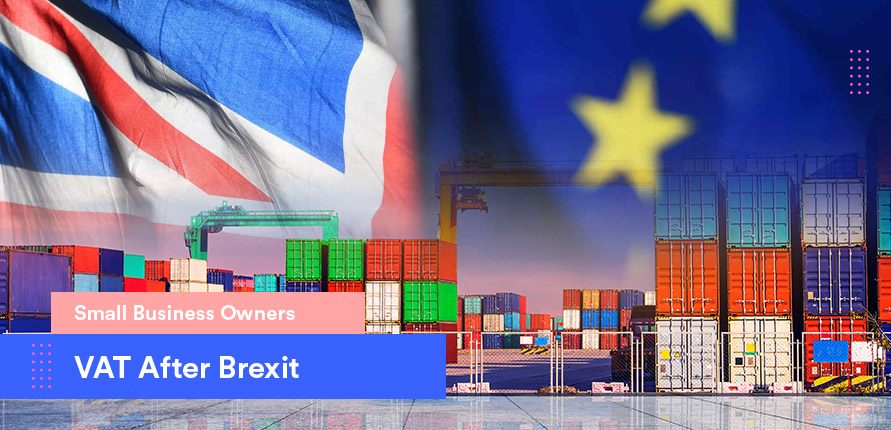
VAT After Brexit: Small Business Owners
The updated Brexit laws on purchasing and shipping products have taken customers off guard. Several individuals have reported unexpectedly high fees due to Brexit. Now that the Brexit transition phase has ended, small companies should be aware of new trading regulations and taxes. The UK government updated the way they charge VAT after Brexit and other import duties on all foreign goods on January 1, 2021.
Before leaving the EU, UK shoppers had to pay VAT on purchases from abroad costing more than £15, on overseas gifts worth more than £39, and on every amount of alcohol, tobacco products, or scent. The country's exit from the European Union has altered the way citizens are paying for importing products from other countries and sending goods outside the United Kingdom. Following Brexit VAT changes, businesses can no longer exchange independently under former VAT on services to EU and customs agreements because of the UK-EU trade pact, and additional taxes and regulations apply.
This may influence you in a several ways if only you are:
- importing/exporting goods or services to the EU
- sending parcels via postal service
- selling products for less than £135 online (which includes the product price, packaging, postage, and insurance)
The £15 exemption for goods and £39 exemption for products labelled as gifts have also been revoked. In other words, UK shoppers will have to pay VAT if they buy such products from abroad. The new import charges in the UK are now distinct from EU tariffs, and they vary based on the products being imported. You can find more about changes on VAT after Brexit on gov.uk.
Changes in the VAT rules after Brexit
Check with your vendors if you import goods from the EU, to ensure they are well set up for UK duty. The new rules require EU sellers to charge UK VAT at the point of sale, rather than HMRC collecting tax when the goods are transported into the country. This ensures that EU companies that wish to deal with the UK must register with HMRC. However, some companies want to skip the additional admin, resulting in some unexpected tax bills before the supply comes.
To avoid problems, consult with your vendors before placing an order to ensure they are licenced and charging UK VAT.
The amount of tax you must pay is determined by the expense of the order. If it is not included in the purchase price, it will be due upon arrival.
| For goods up to £135 | Depending on the commodity, the VAT rate will range from 0 to 20%. |
| For goods over £135 | These vary from 0 to 25% import duty, as well as UK VAT(usually 20%), which can be paid when you purchase the products. |
However, you can forward the VAT costs to the consumer (your customer) by the way of reverse charge when you buy from an EU vendor. This only applies to products purchased to resell in the UK, not to equipment or things used to run your company. Similarly, reverse charge VAT applies to businesses that render services to an EU vendor (who is also non-VAT registered), and all other services supplied will also be subject to it. Also, in case of construction services, if the reverse charge part of the supply is 5% or less than 5% out of the value of the whole supply then the reverse charge part of the supply can be disregarded (referred to as “5% disregard”) and standard rules will be applicable if the customer makes an end user or notifies the intermediate supplier.
How to use the reverse charge VAT after Brexit:
- You must be VAT registered.
- The EU business from which you are purchasing must be licenced with HMRC.
- When you purchase stock from an EU vendor, you must have your VAT number.
Maintaining open communication and transparency with your vendors will help ease the transition to these new regulations and ensure that you are all on the same page.
If your company is used to doing business with Europe, you should be aware of the following additional paperwork and charges when importing and selling goods:
EORI number & EU EORI number
If you are transporting goods between the United Kingdom and the European Union, you will require an EORI number that begins with GB. If you wish to export or import goods to Northern Ireland, you will need a number beginning with XI.
HMRC accepts online applications for EORI numbers.
When exporting to the European Union, you will also need an EU EORI number. To ensure that you will continue to move goods into and out of the EU, you can apply for an EU EORI number from the customs authority in whichever EU state you work with the most. This can be obtained from the customs authority in the EU country where you submitted your first declaration or requested your first ruling. Click here for a list of EU customs websites.
License and certificates
If you are shipping goods to consumers outside the UK, you will need to fill out a customs declaration form.
Check current trade agreements
You must review the specifics of each trade agreement with each nation to check that the products will be imported using the proper procedures.
Delaying the application of customs duties on goods
To assist companies in adapting to the amendments, the government has announced that customs payments may be postponed until June 30, 2021. However, the government advises that you hire someone to assist you to make the process run more smoothly. If you need to import goods regularly for your company, you can opt to pay your customs charges monthly. On the government website, you can learn more about applying for a duty deferment account.
In the United Kingdom, you can apply for VAT online via the government website.
If you are exporting goods to countries within the EU, you can be required to apply for VAT in each region. More details are available on the European Commission's website. As of January 1, you must have a customs broker to handle your import/export declarations. Since tax and tariffs are confusing, we would suggest, you use this as a reference only and consult with a professional about your specific situation.












